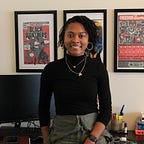Top 3 Books that Changed My Perspective on Feminism
“I am a Black Feminist. I mean I recognize that my power as well as my primary oppressions come as a result of my blackness as well as my womaness, and therefore my struggles on both of these fronts are inseparable.” — Audre Lorde
I remember seeing the quote above for the first time in the National Museum of African American History and Culture. It put words to what I was struggling with at the time. It felt like a betrayal to recognize my womaness as equal to my Blackness. Somehow I had internalized that Black liberation was tied to freeing and protecting Black men first and that left very little room to critique how Black men use the patriarchy to oppress Black women. I have seen Black women be accused of “trying to keep the Black man down” when attempting to hold them accountable. Another issue I had with identifying as a feminist is the centering of white women. In school we are taught of the suffragettes Susan B. Anthony and Elizabeth Cady Stanton, but never about how they truly felt about Black women. Even when the #MeToo Movement was gaining steam, the face of the movement became white women even though it was founded by a Black woman (Hey Tarana Burke).
It was my first attempt to read Eloquent Rage by Brittney Cooper that sent me into the rabbit hole of reading Black feminist thought. So, I am recommending my top 3 books that helped me develop a different relationship with feminism. It helped me recognize that showing up as all my identities is a contribution to the movement.
Eloquent Rage, By Brittney Cooper
It was only right to start here because the first few pages of Eloquent Rage describes how I felt perfectly. Professor Cooper also struggled with the concept of feminism, but she had a friend that called her in and took her to a bell hooks lecture. She then began to do her own research which led her to Audre Lorde, Sister Outsider. From there she was able to understand how feminism gives another lens to analyze the events of her personal life as well as her professional work. It gave her permission to own her rage.
“Serena [Williams] play, particularly when she’s beating white women, is like watching eloquent rage personified. Her shots are clear and expressive. Her wins are exultant. Her victories belong to all of us, even though she’s the one who does all the work. That’s kind of how it feels to be a Black woman. Like our victories belong to everyone, even though we do all the work. But here’s the thing- if I can master my force in my life and slay it like Serena slays tennis balls on the court, then I’m happy to share the wealth.” — Brittney Cooper
Sister Outsider, By Audre Lorde
Audre Lorde’s work is often quoted. One of the most popular quotes is, “the master’s tools will never dismantle the master’s house.” In this book of essays, Lorde, a Black Lesbian Feminist, offers intersectional observations on age, race, class, and sex. She takes taboo subjects and makes them more relatable. She shows that it is okay to own all the parts of ourselves that makes us human such as our rage. I recommend starting with Audre Lorde because she gives a foundation to understand what more contemporary Black feminist have built upon.
I am not only a casualty, I am a warrior. What are the words you do not yet have? What do you need to say? What are the tyrannies you swallow day by day and attempt to make your own, until you will sicken and die of them, still in silence? Perhaps for some of you here today, I am the face of one of your fears. Because I am woman, because I am Black, because I am lesbian, because I am myself — a Black woman warrior poet doing my work — come to ask you, are you doing yours? — Audre Lorde, Transformation of Silence
How We Get Free Black Feminism and the Combahee River Collective, Edited By Keeanga- Yamahtta Taylor
Until reading this book, I had no idea about who was involved with the Combahee River Collective let alone what the movement represented. It is a sad reminder of so much history that Black people have to uncover on their own. The Combahee River Collective is named after the Combahee Ferry Raid during the Civil War, which was led by Harriet Tubman. Tubman became the first woman to lead a major military operation in the United States when she and 150 African American Union soldiers rescued more than 700 slaves. The Collective was founded in 1974 by a group of Black women, Barbra Smith, Beverly Smith, and Demita Frazier. The book discusses their ability to think beyond their time such as using similar terms to intersectionality, identity politics and bringing a more economic approach to their movement. The Combahee Collective had a collective statement that outlined the history, their beliefs, and the challenges they will face. What I also loved about this book of interviews is that these intellectuals were still working on framing and their thoughts are still ever evolving. It demonstrates that there is always work to be done and ways to expand our ideas.
If you are interested in purchasing any of the books listed click here to visit my affiliate bookshop.
Do you have other recommendations? Leave your comments below.
